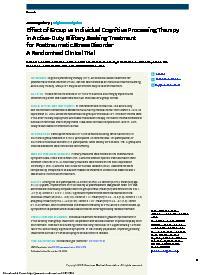Effect of Group vs Individual Cognitive Processing: Therapy in Active-Duty Military Seeking Treatment for Posttraumatic Stress Disorder A Randomized Clinical Trial
IMPORTANCE Cognitive processing therapy (CPT), an evidence-based treatment for posttraumatic stress disorder (PTSD), has not been tested as an individual treatment among active-duty military. Group CPT may be an efficient way to deliver treatment. OBJECTIVE To determine the effects of CPT on PTSD and co-occurring symptoms and whether they differ when administered in an individual or a group format. DESIGN, SETTING, AND PARTICIPANTS In this randomized clinical trial, 268 active-duty servicemembers consented to assessment at an army medical center from March 8, 2012, to September 23, 2014, and were randomized to group or individual CPT. Inclusion criteria were PTSD after military deployment and stable medication therapy. Exclusion criteria consisted of suicidal or homicidal intent or psychosis. Data collection was completed on June 15, 2015. Analysis was based on intention to treat. INTERVENTIONS Participants received CPT (the version excluding written accounts) in 90-minute group sessions of 8 to 10 participants (15 cohorts total; 133 participants) or 60-minute individual sessions (135 participants) twice weekly for 6 weeks. The 12 group and individual sessions were conducted concurrently. MAIN OUTCOMES AND MEASURES Primary measureswere scores on the Posttraumatic Symptom Scale–Interview Version (PSS-I) and the stressor-specific Posttraumatic Stress Disorder Checklist (PCL-S); secondary measures were scores on the Beck Depression Inventory–II (BDI-II) and the Beck Scale for Suicidal Ideation (BSSI). Assessments were completed by independent evaluators masked to treatment condition at baseline and 2 weeks and 6 months after treatment. RESULTS Among the 268 participants (244 men [91.0%]; 24women [9.0%]; mean [SD] age, 33.2 [7.4] years), improvement in PTSD severity at posttreatmentwas greater when CPTwas administered individually compared with the group format (mean [SE] difference on the PSS-I, −3.7 [1.4]; Cohen d = 0.6; P = .006). Significant improvementswere maintained with the individual (mean [SE] PSS-I, −7.8 [1.0]; Cohen d = 1.3; mean [SE] PCL-S, −12.6 [1.4]; Cohen d = 1.2) and group (mean [SE] PSS-I, −4.0 [0.97]; Cohen d = 0.7; mean [SE] PCL-S, −6.3 [1.4]; Cohen d = 0.6) formats, with no differences in remission or severity of PTSD at the 6-month follow-up. Symptoms of depression and suicidal ideation did not differ significantly between formats. CONCLUSIONS AND RELEVANCE Individual treatment resulted in greater improvement in PTSD severity than group treatment. Depression and suicidal ideation improved equally with both formats. However, even among those receiving individual CPT, approximately 50% still had PTSD and clinically significant symptoms. In the military population, improving existing treatments such as CPT or developing new treatments is needed.
Geachte bezoeker,
De informatie die u nu opvraagt, kan door psychotraumanet niet aan u worden getoond. Dit kan verschillende redenen hebben,
waarvan (bescherming van het) auteursrecht de meeste voorkomende is. Wanneer het mogelijk is om u door te verwijzen naar de bron
van deze informatie, dan ziet u hier onder een link naar die plek.
Als er geen link staat, kunt u contact opnemen met de bibliotheek,
die u verder op weg kan helpen.
Met vriendelijke groet,
Het psychotraumanet-team.
Reference:
Patricia A. Resick, Jennifer Schuster Wachen, Katherine A. Dondanville, Kristi E. Pruiksma Jeffrey S. Yarvis, Alan L. Peterson, Jim Mintz, and the STRONG STAR Consortium | 2017
In: JAMA Psychiatry, ISSN 2168-6238 | 74 | 1 | 28-36
http://doi.org/10.1001/jamapsychiatry.2016.2729
In: JAMA Psychiatry, ISSN 2168-6238 | 74 | 1 | 28-36
http://doi.org/10.1001/jamapsychiatry.2016.2729


